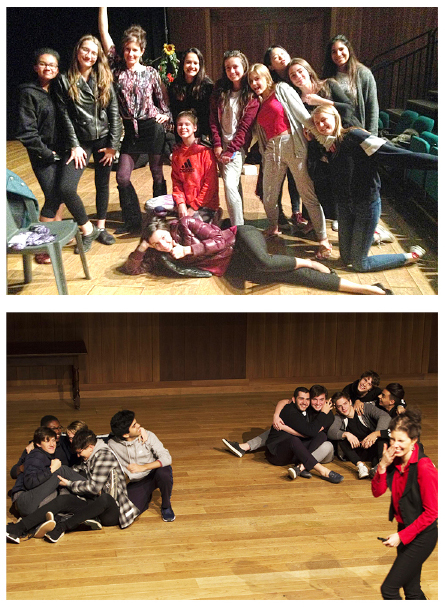Body Image, Media Literacy, and the Power of the Heart
November 24, 2017
Brie Mathers, CPS Partnership leader and founder of Love the Skin You?re In, is an activist and motivational speaker who has presented to more than 100,000 teens worldwide through her multimedia event. Brie spoke to high school students and faculty members about body image, mental health, media literacy, and mindfulness during an inspiring visit to The American School in Switzerland (TASIS) campus in November 2017.
Read the full interview by TASIS student writer Jessica Landa.
Excerpts from the interview:
Jessica: Why is it important to focus on a younger audience rather than teaching the industries that influence that audience (or rather the source)?
 Brie: It is important to teach the industries, but as corporations have become predatory, corporate responsibility has become an oxymoron. Through education, we nurture change through enlightened future leaders. Worldwide we are witnessing the rise of this domination system. I like to reference the work of Dr. Riane Eisler, who wrote the groundbreaking book?The Chalice and the Blade?30 years ago. It’s been published in 27 different languages around the world. She researched ancient history to understand how the rise of toxic leaders like Hitler can happen. What she found is that thousands of years ago in cultures like Minoan Crete, goddess-worshipping cultures thrived. Those cultures expressed a partnership model. They weren’t matriarchal, which is not by the way the opposite of patriarchy; they were based in a partnership/collaborative system, which is the opposite of patriarchy. The principles of partnership include shared leadership, mutuality, interdependence, and mutual respect. The world was a more equitable and sustainable place for the people living in those cultures. Herein lies the future of our planet.
Brie: It is important to teach the industries, but as corporations have become predatory, corporate responsibility has become an oxymoron. Through education, we nurture change through enlightened future leaders. Worldwide we are witnessing the rise of this domination system. I like to reference the work of Dr. Riane Eisler, who wrote the groundbreaking book?The Chalice and the Blade?30 years ago. It’s been published in 27 different languages around the world. She researched ancient history to understand how the rise of toxic leaders like Hitler can happen. What she found is that thousands of years ago in cultures like Minoan Crete, goddess-worshipping cultures thrived. Those cultures expressed a partnership model. They weren’t matriarchal, which is not by the way the opposite of patriarchy; they were based in a partnership/collaborative system, which is the opposite of patriarchy. The principles of partnership include shared leadership, mutuality, interdependence, and mutual respect. The world was a more equitable and sustainable place for the people living in those cultures. Herein lies the future of our planet.
Jessica: What do you realistically hope to see in 10 years? What changes can you visualize occurring?
Brie: When I began doing these talks, body image was the struggle. With the current prevalence of dehumanizing imagery and pornography, young women now believe that their lovability is inextricably linked to their sexual availability and this, unfortunately, misinforms a lot of young people about intimacy and connection. The internet has grown up at the same time as the escalation in teen mental illness. Mental health statistics such as up to 23% of grade nine girls contemplating suicide (Girl Scouts 2017 State of Girls Report) are of grave concern and have arisen within an international thicket of curated social media lives.
That said, I wouldn’t feel so inspired to get out of bed in the morning if I didn’t believe that women are reaching a critical mass. When women comprise 20?30% of an institution, change happens. We are witnessing that currently with the #metoo campaign responding to Harvey Weinstein’s exploits. Famous women calling out those who have hurt them invigorates women around the world. This is how social change happens.
In the end, we can aspire to be perfect and admired or we can drop into the gift of being authentic, lovable, and loving and recognize our common, vulnerable, messy, exquisite humanity. As one young man at TASIS reflected in his testimonial, “This taught me that love can change everything.” Looking toward the future, I’ll go with that.



Leave a Reply